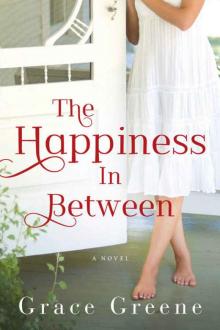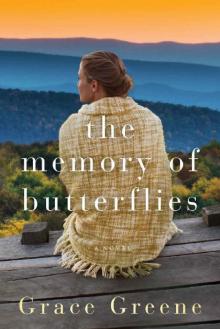- Home
- Grace Greene
The Memory of Butterflies: A Novel Page 19
The Memory of Butterflies: A Novel Read online
Page 19
Ellen’s lips parted, words wanted to be said, but she seemed to have difficulty finding the right ones. Finally, she said, “How awful for them. For everyone.”
I nodded.
She added, “Your parents. My dad’s parents. I don’t have grandparents.” Her tone was pained. “Things like this affects the whole family, doesn’t it?”
“It does.”
“Does it make you sad?” she asked.
“I don’t have any memory of my parents, so it’s a little different in that way for me.”
“That was a lot of people living in the one house. It was small . . . I’m sorry. I don’t mean to criticize the house.”
“Well, it’s true, certainly. Maybe that intensified the pressure on him. Living with his in-laws and in close quarters . . .”
“Maybe it was good they didn’t tell you. Every day you would’ve been thinking about how your mom and dad died right there in the house.”
“Perhaps. And my knowing the truth would’ve made it impossible for Gran to pretend otherwise.”
Ellen sat in silence for a minute, staring ahead. “Then you fell in love with my dad and he died. How awful it must’ve been for Gran to experience such tragedy all over again.”
I let her words rest in the silence. As long as I didn’t contradict the words or add to them, they were almost the truth. They were Ellen’s truth anyway, as far as she knew.
So many lies. It had felt right at the time. The thing to do. The best choice. But more and more, I was feeling their weight.
“Let’s get some supper.”
Ellen put the car into drive and turned on the blinker before pulling back out onto Cross County Road.
“Dell’s Diner or home?” she asked.
“Home, I think. How would you feel about bacon and eggs tonight?”
She smiled. “I’ll cook.”
“You?” I teased.
“Just like my mom taught me.”
I reached out to touch her hair. “I’m proud of you, my dearest daughter. I can’t imagine a greater gift than you in my life.” There’d been another Ellen, the first Ellen. The two had long ago merged into one in my heart, and my head had had to accept it, and reaccept it, from time to time.
“Then I think we’re both lucky, Mom. I’m lucky I was born to you. And I appreciate knowing the truth. I understand why you didn’t tell me before, when I was younger and all, and I’m glad you trust me with knowing now.”
That night, as I was locking up and turning off lights on my way to bed, I noticed the baby book was gone from the kitchen table. I’d placed it there when we came home. It had still been there when we ate our supper seated at the island.
Like Gran, like Ellen? Except that unlike Gran, who’d hidden it, Ellen had claimed it. When I walked past her room, I saw it on her desk, and it felt right. That night, I settled in my bed, cozy with the blanket over my legs, and wrote down a list of “firsts.” First tooth, first steps, first birthday—not the actual events, but as I wrote them down, I imagined how it would’ve been in real life, and it almost felt as if they’d happened the way I described them. I even drew little pictures of the reminiscences. It was the best I could do for her. I was careful to note at the top that I couldn’t be totally sure the dates were accurate, since I was recording the events long after the fact.
It was a small gift for Ellen. When I was done, I went to her room.
She was asleep. Teenagers slept like toddlers, except they hogged the whole bed. Adulthood would steal the ability to sleep soundly and heedlessly through the night. By the light of the hallway, I went to her desk and slipped the papers from my journal into her baby book for her to find in the morning. Then I stood near her bed and watched her sleeping.
Her eyelashes fluttered and she mumbled, “Is something wrong, Mom?”
I touched her hair. “No, all’s well. Good night, my sweet Ellen.”
CHAPTER NINE
It was as if the clearing away of the fire debris was a signal for time to fast forward.
In April I watched the foundation being dug, the concrete footing poured, the bricks rise, and the fresh gravel being dumped into what would become the crawl space. The floor joists were installed and plywood sheets were laid for the subfloor. The framing had begun.
We were suddenly in May, and Ellen’s graduation was less than a month away.
I went out to the jobsite most days, but only for a short stay. I tried to refocus on my pottery and the shop, and I also began planning for the move.
The lights were out in the front room of Cub Creek Pottery, and the door sign was turned to CLOSED. There was little traffic anyway. I supplied pottery to gift shops in the regional area and to a few locations outside of Virginia, but for the most part, my clients were few and honestly, my pottery work was uninspired. When I saw the clay work being produced by others, especially online or in glossy magazines, I felt mediocre.
It would be different, I told myself, when I was back out in the Hollow. Working in Cooper’s Hollow, away from this shop in town that had no history, no flavor for me, would provide the spark.
Ellen was consumed with preparing for college, talking about college, final exam nerves, and texting incessantly with her friends about all of it. I was glad she had friends to stress and de-stress with because it was wearing me down. They were going out tonight—she and Bonnie and a couple of their other friends. They were going to see a movie, as if this were the last movie they’d ever see . . . which it kind of was—it was the last movie they’d see as high school seniors and in a local theater and so on. Such high drama, and they reveled in it.
I’d protested that this was Sunday and she had school in the morning and not to be out late, and then realized that was likely the last time I’d be giving that admonition.
I pulled out the clay and did some wedging. I threw it against the table. I pounded on it with my fist. By the time the consistency felt right, the worst of my stress had eased, but I felt deflated again. Ellen would soon graduate and would leave for Tech by mid-August. Wedging clay didn’t fix that. I wrapped the clay tightly in plastic, and washed up at the sink.
My cell phone rang. Roger.
“Everything good?” he asked.
“Sure.”
“I missed seeing you today. Did you choose the light fixtures you wanted in the great room and in the kitchen?”
“Not yet. I’ll get it done.” I turned off the power switches as I spoke.
“Are you up for dinner?”
I stopped. “Tonight?”
“That’s the usual timing for dinner. Or we can call it supper, if you like that better.”
He was trying to lighten the mood. I tried to smile.
“Honestly, Roger, I’m not feeling so great. I’m a little headachy.”
“Going out to eat might help.”
“It might, but I don’t think I’m up to making conversation.”
There was a long pause, and then he said, “I don’t need conversation. We’re friends. You can be any way you want or need to be with me.”
“Ellen is going out with Bonnie and some other friends this evening.”
“Just girls? Or is this a girl-boy thing?”
My silence lasted longer than intended.
“I see,” he said.
“No, really, it’s fine. It’s a group of friends. I hadn’t considered . . . but she would’ve said if there was an actual boyfriend, right?” I sighed. Ellen was pretty and smart but hadn’t dated much, and I was totally fine with that. I hadn’t handled dating or love very well. My mother hadn’t. I hoped Ellen, who was much more sensible and goal-oriented, would do better, but a little more maturity wouldn’t hurt her, so going out with friends in groups seemed safer. Of course, there was no guarantee about anything.
My brain was too scrambled. Roger was right.
“Maybe I do need to get out and do something normal,” I said. “Something pleasantly distracting.”
“Five thirty?” he s
uggested.
“That will work. Where shall we go?”
“How about Italian in Louisa?”
“Perfect,” I said.
Roger rang the doorbell at five thirty exactly. He gave me the once-over and said, “You seem better now.”
“I am. I don’t understand what’s wrong with me.”
“Do you want to talk about it?”
I shook my head. “No.” As I snapped the seat belt into place, the words came anyway.
“Regrets, maybe. We all make mistakes, right? Some we can take back. Some we can’t.” Or wouldn’t even if we could, I added silently.
“That sounds . . . philosophical. Or remorseful.”
“Probably some of each.”
“Want to talk about it? Things usually make a lot more sense and assume more reasonable proportions when shared with a friend.”
“Not this, Roger. Trust me. Besides, everyone has done something they end up questioning time and again.”
“Well, you’re right. We all make mistakes or choices that go wrong. I’ve made plenty of mistakes in my life, and in every job I’ve had. If you’re living, then mistakes are guaranteed. It makes the successes all the sweeter. That’s life, Hannah.”
He touched my hand. His hands were larger than mine. My fingers had been toughened over the years of manhandling clay, and I didn’t get manicures often enough. His strong, square hands were well groomed; the fingernails were clean and neat. That seemed important to me. His were honest hands. Gently, I eased mine away.
We’d hardly been seated in the restaurant when my cell phone rang. Ellen’s name was on the screen. I grabbed it and answered.
“Ellen?”
“Mom? It’s OK. I’m not hurt.”
Her voice was breathless. She sounded like she was crying.
“What’s wrong?” I was already standing, looking around the room. Where is my purse? My keys?
“What’s wrong?” Roger echoed my words.
Ellen continued. “They’re taking us to the hospital in Charlottesville. But I’m fine. A couple of the kids were hurt. We hit a tree, Mom.”
My heart rate ratcheted up even more. “I’m on my way. I’ll meet you there.” I added, “How are you getting to the hospital?”
“By ambulance. Please be careful, Mom. Don’t rush. I’ll be there soon, and I’m OK, truly.”
I didn’t want to disconnect. I wanted this phone connection to stay live all the way to Charlottesville, if possible, but Ellen said, “I need to let Bonnie call her parents. I’ll see you soon, Mom.”
She disconnected.
My purse? Where did I leave it? My hands clenched, and I realized I was holding it.
Roger was suddenly standing beside me, his hands on my shoulders. “Calm down.”
“Calm down? My daughter is on her way to the hospital. I don’t have time to think it through, much less calm down.”
“I’ll take you. You can’t drive like this. Your daughter needs you to arrive in one piece.” His eyes bore into mine. “Now take a deep breath and let it out slowly, then tell me what she said.”
“She said she’s not hurt. The ambulance is taking them to the hospital. A tree. They hit a tree, Roger.” My voice went high as it hit the end of the sentence. I closed my eyes. “I need to calm down. You’ll drive me there?”
“Of course. Besides, I care about Ellen. I’d like to see for myself that she’s OK.”
“That’s what Ellen said . . . that she was OK. OK is such a big word, isn’t it? A huge word, an awful word, a word that means nothing because it could mean anything.” I forced my eyes to open. “Let’s go.”
In the fringe of the woods bordering the winding state road, wild eyes lit the night. Deer, of course, but the eyes of other creatures, too. My hands had been shaking since I’d gotten the call, and all those eyes seemed threatening. Anything that might delay me in reaching Ellen was unacceptable. I wanted Roger to drive faster.
Roger noticed my anxiety. He reached across the center console and grasped my hand. “She’s fine, Hannah. She said so, and we’ll see her soon.”
I nodded. “Two of her friends aren’t fine, though, and she could be downplaying her own situation. She could have an injury that doesn’t show up right away.”
“There’s no value in worrying. Once you’re there and you can see for yourself, you’ll see she’s fine, and you’ll be fine.”
“You’re right, Roger. Thank you.”
“That’s better.”
“I could’ve driven. I’m sorry to have dragged you out here.”
“I volunteered. Besides, you’re too distracted. Distracted, worried driving—it’s not a good mix.” He smiled at the night and the dark road ahead. “I’m glad you let me help tonight.”
“I’m accustomed to being independent.”
Roger took the ramp onto the interstate. Not much farther, though the Charlottesville stoplights and traffic slowed us down. The stop-and-start pace wreaked havoc on my nerves.
Roger spoke again. “You had to be independent. You took care of yourself, your grandmother, your daughter—all on your own. It’s a good thing to be, but you have to know when and how to let others help you.”
I could’ve told him that if you allow others into your life, then suddenly they want to know about you, and secrets have a way of getting out when people get too close. I didn’t say that, though, and instead told him, “You’re helping me. You’re building my house.”
“I build many houses. It’s my profession. It’s not the same thing.”
“What about you?” I turned the focus to him. “You’re also very independent.”
Roger frowned. “It wasn’t a choice. It’s just how it worked out.”
“It was the same for me. Not what I’d planned. Gran needed my help, so I put off college, only for a year, I thought, and then along came Ellen. But you know most of that already. We’ve talked about it before.”
“I’m sorry I never met your grandmother. I—”
“How much longer do you think?” I interrupted.
“We’re here. There’s the ER sign.” He touched my cheek. “You going to be OK?”
“OK?” I said, then caught myself. “What a word.” We both laughed a little, and that helped. I felt stronger.
Roger dropped me at the door to the emergency room. “You go,” he said. “I’ll park the car.” I nodded thanks, slipped out of his vehicle, and dashed through the automatic doors.
I blew through the sliding doors at the hospital, past the reception area, then headed straight back. I expected a security guard to grab me. I was confident I could give him the slip or drag him with me, but no one challenged me or tried to stop me from reaching my daughter. As if we each had built-in homing devices, I went straight to Ellen’s cubicle and pushed aside the curtains. She was sitting in an ER bed but was unattended and, indeed, except for a bump and a bandage on her forehead, she looked fine. I dropped my purse on the foot of the wheeled bed and threw wide my arms. Ellen reached toward me. We hugged for one long moment. Ellen surprised me. Her grip was like iron, and she kept repeating, “Mommy, Mommy, Mommy . . .” over and over.
“Are you Ms. Cooper?” a man said.
I turned toward him as I tried to ease Ellen’s grip. “I am.”
“We did a head scan to be on the safe side. All her vitals are good. There are no broken bones. The bump on the head appears superficial. She’ll need to take it easy for a couple of days. She may also feel some anxiety or emotional trauma. If that develops, be sure to contact your family doctor and—”
“Wait a minute,” I interrupted. I kept my hands on Ellen but let some air come between us. “What happened?”
The doctor looked toward the desk, beyond where I could see from my vantage point with the curtain halfway pulled and blocking my view. “I’ll let the officer know you’re here. Meanwhile, your daughter can fill you in.”
His words were colorless, but his face was kind, and the smile he offered El
len was warm. That told me she was OK—OK as far as the police officer was concerned, too—I felt sure. There was nothing severe in the doctor’s expression—at least not toward my daughter. He left.
I sat on the edge of the bed. “Tell me what happened.”
“I don’t know, Mom. Honest. We were on our way to the movie theater in Charlottesville. We were still out of town, out in the country, when . . . when it all went crazy.”
“Who was driving?”
“Bonnie. She hit her head. Or the airbag hit her. I don’t know, but she was bleeding a lot.” Ellen touched her own head to indicate where Bonnie’s head was bloody.
“Your head . . . Is that swelling from the airbag?”
“Um, no. I was in the backseat. Her car doesn’t have side airbags.”
I frowned. “Who was in the front seat with Bonnie?”
“Her boyfriend, John. You met him once, I think.”
“How is he?”
“I think he hurt his shoulder.”
“You were in the backseat?”
She nodded.
“With?”
“Braden.”
It took all my inner strength to control my reaction, to keep my expression even. Her friend was in the front seat, driving, and Ellen was in the backseat with a boy. I tried to digest that and speak without sounding too suspicious or critical. “Do I know him?”
“No, I don’t think so. His family moved back to the area last year.”
“I didn’t realize it was a double date.”
“Mom. I’m a senior. I’m allowed, right?”
“Did you deliberately let me think this was just another group date?” I waved my hand, but gently, then straightened the sheet over her legs. “If so, I’d like to know why?”
“It’s not a big deal, Mom. I feel like you don’t want me to date. I didn’t want you to worry.”
“No worries. We’ll talk about this more at home.” I touched her forehead and smoothed stray hairs back out of her face. “And yes, it is perfectly fine for you to date. I want to know beforehand so I don’t find out this way. But it’s not worth you wasting even a moment of worry over it right now.”

 Wildflower Hope (The Wildflower House)
Wildflower Hope (The Wildflower House) The Happiness in Between
The Happiness in Between The Memory of Butterflies: A Novel
The Memory of Butterflies: A Novel Clair (Beach Brides Book 4)
Clair (Beach Brides Book 4)